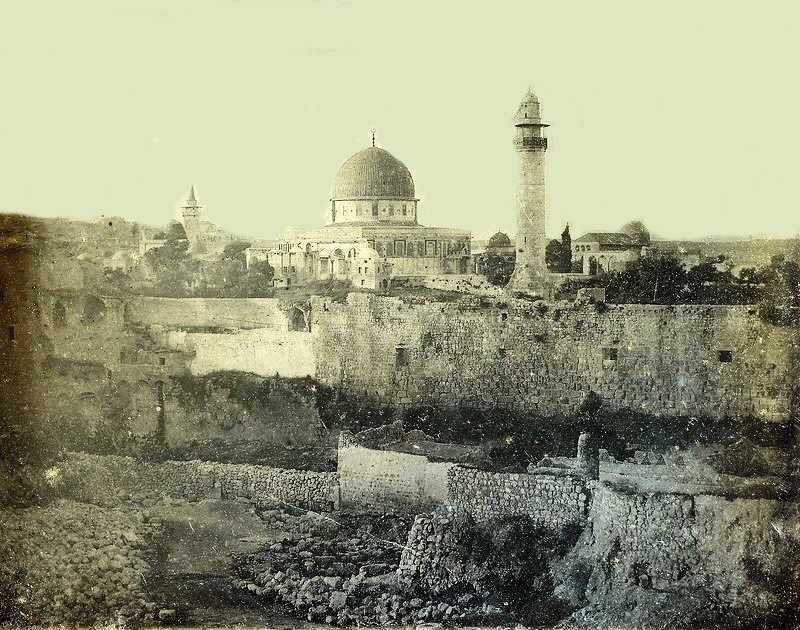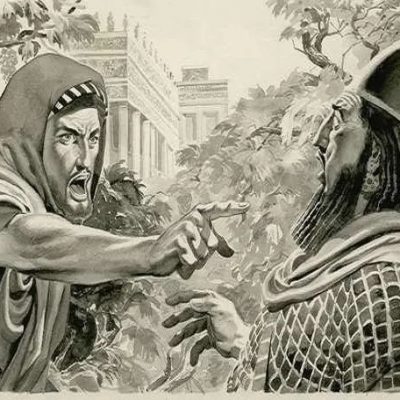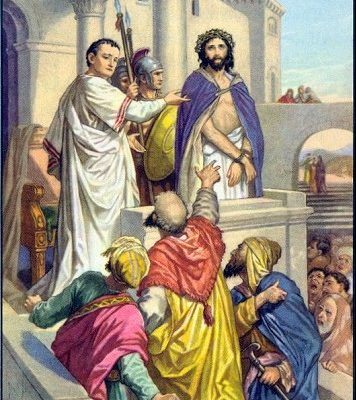Mount Moriah

Mount Moriah means “chosen by Jehovah”. It is an elongated ridge with the southern end of the ridge at the intersection of the Kidron and Hinnom valleys. The northeastern ridge is the present Damascus Gate of the Old City. The Temple Mount and the Old City of Jerusalem as well as the Dome of the Rock, a Moslem shrine, is located on top of Mount Moriah. The Mount of Olives is just east of Mount Moriah by a few hundred meters.
God sent Abraham to the top of Mount Moriah to sacrifice his son Isaac as an offering to the LORD GOD. Abraham did as He instructed and built an altar, laid the wood, bound his son, and laid him upon the altar of wood. When Abraham stretched forth his hand to slay his son, an Angel of the LORD called out to Abraham from Heaven stopped him. The sacrifice of Isaac was replaced by a ram caught in the thicket by his horns. Abraham took the ram and offered it up for a burnt offering in the stead of his son. Abraham named that place “Jehovahjireh” which means “God will see”, which became the symbolic name for Mount Moriah.
“And it came to pass after these things, that God did tempt Abraham, and said unto him, Abraham: and he said, Behold, [here] I [am]. And he said, Take now thy son, thine only [son] Isaac, whom thou lovest, and get thee into the land of Moriah; and offer him there for a burnt offering upon one of the mountains which I will tell thee of.”
“And Abraham rose up early in the morning, and saddled his ass, and took two of his young men with him, and Isaac his son, and clave the wood for the burnt offering, and rose up, and went unto the place of which God had told him. Then on the third day Abraham lifted up his eyes, and saw the place afar off. And Abraham said unto his young men, Abide ye here with the ass; and I and the lad will go yonder and worship, and come again to you. And Abraham took the wood of the burnt offering, and laid [it] upon Isaac his son; and he took the fire in his hand, and a knife; and they went both of them together. And Isaac spake unto Abraham his father, and said, My father: and he said, Here [am] I, my son. And he said, Behold the fire and the wood: but where [is] the lamb for a burnt offering? And Abraham said, My son, God will provide himself a lamb for a burnt offering: so they went both of them together. And they came to the place which God had told him of; and Abraham built an altar there, and laid the wood in order, and bound Isaac his son, and laid him on the altar upon the wood. And Abraham stretched forth his hand, and took the knife to slay his son.”
“And the angel of the LORD called unto him out of heaven, and said, Abraham, Abraham: and he said, Here [am] I. And he said, Lay not thine hand upon the lad, neither do thou any thing unto him: for now I know that thou fearest God, seeing thou hast not withheld thy son, thine only [son] from me. And Abraham lifted up his eyes, and looked, and behold behind [him] a ram caught in a thicket by his horns: and Abraham went and took the ram, and offered him up for a burnt offering in the stead of his son. And Abraham called the name of that place Jehovahjireh: as it is said [to] this day, In the mount of the LORD it shall be seen.”
“And the angel of the LORD called unto Abraham out of heaven the second time, And said, By myself have I sworn, saith the LORD, for because thou hast done this thing, and hast not withheld thy son, thine only [son]: That in blessing I will bless thee, and in multiplying I will multiply thy seed as the stars of the heaven, and as the sand which [is] upon the sea shore; and thy seed shall possess the gate of his enemies; And in thy seed shall all the nations of the earth be blessed; because thou hast obeyed my voice. So Abraham returned unto his young men, and they rose up and went together to Beersheba; and Abraham dwelt at Beersheba.” (Genesis 22:1-19).
The angel of the LORD commanded David to set up an altar unto the LORD in the threshing floor of Ornan the Jebusite, after the destruction of Jerusalem was halted. King David bought the threshing floor from Ornan the Jebusite, an inhabitant of Jebus (early name for Jerusalem) and the descendants of the 3rd son of Caanan, and paid full price for the land with six hundred shekels of gold by weight.
“Then the angel of the LORD commanded Gad to say to David, that David should go up, and set up an altar unto the LORD in the threshingfloor of Ornan the Jebusite. And David went up at the saying of Gad, which he spake in the name of the LORD. And Ornan turned back, and saw the angel; and his four sons with him hid themselves. Now Ornan was threshing wheat. And as David came to Ornan, Ornan looked and saw David, and went out of the threshingfloor, and bowed himself to David with [his] face to the ground. Then David said to Ornan, Grant me the place of [this] threshingfloor, that I may build an altar therein unto the LORD: thou shalt grant it me for the full price: that the plague may be stayed from the people. And Ornan said unto David, Take [it] to thee, and let my lord the king do [that which is] good in his eyes: lo, I give [thee] the oxen [also] for burnt offerings, and the threshing instruments for wood, and the wheat for the meat offering; I give it all. And king David said to Ornan, Nay; but I will verily buy it for the full price: for I will not take [that] which [is] thine for the LORD, nor offer burnt offerings without cost. So David gave to Ornan for the place six hundred shekels of gold by weight. And David built there an altar unto the LORD, and offered burnt offerings and peace offerings, and called upon the LORD; and he answered him from heaven by fire upon the altar of burnt offering. And the LORD commanded the angel; and he put up his sword again into the sheath thereof. At that time when David saw that the LORD had answered him in the threshingfloor of Ornan the Jebusite, then he sacrificed there. For the tabernacle of the LORD, which Moses made in the wilderness, and the altar of the burnt offering, [were] at that season in the high place at Gibeon. But David could not go before it to enquire of God: for he was afraid because of the sword of the angel of the LORD.” (1 Chronicles 21:18-30).
King Solomon built the house of the LORD at Jerusalem in Mount Moriah. Mount Moriah is where the LORD appeared unto David the father of Solomon, in the place David had prepared in the threshing floor of Ornan the Jebusite.
“Then Solomon began to build the house of the LORD at Jerusalem in mount Moriah, where [the LORD] appeared unto David his father, in the place that David had prepared in the threshingfloor of Ornan the Jebusite.” (2 Chronicles 3:1).
Today, Mount Moriah refers to the Temple Mount for Jews, Golgotha for Christians, and the Dome of the Rock for Muslims (Scham, “High Place,” 654–55). Many Jews hold the tradition that the cornerstone of the temple at Mount Moriah was the rock upon which Abraham attempted to sacrifice Isaac, thus becoming the foundation for all temple sacrifices. Christians traditionally expand on this sacrificial significance by viewing Mount Moriah as the place of Christ’s crucifixion—the ultimate substitutionary sacrifice. Muslims traditionally believe that the sacrificial rock is the pedestal from which Muhammad ascended from earth into heaven, and as such revere the site as the Dome of the Rock. Although modern archaeology and historical studies have been unable to definitively prove any of these traditional beliefs, they remain of quintessential importance for those who hold them in interpreting the significance of this location in each of the religion’s sacred texts (Scham, “High Place,” 654–55).
Reference:
Scham, Sandra. (2004). “High Place: Symbolism and Monumentality on Mount Moriah, Jerusalem.” Antiquity 78, no. 301: 647–60.
Cite Article Source
MLA Style Citation:
Holstein, Joanne “Mount Moriah:.” Becker Bible Studies Library May 2015.<https://guidedbiblestudies.com/?p=2836,>.
APA Style Citation:
Holstein, Joanne (2015, May) “Mount Moriah:.” Becker Bible Studies Library. Retrieved from https://guidedbiblestudies.com/?p=2836,.
Chicago Style Citation:
Holstein, Joanne (2015) “Mount Moriah:.” Becker Bible Studies Library (May), https://guidedbiblestudies.com/?p=2836, (accessed).

